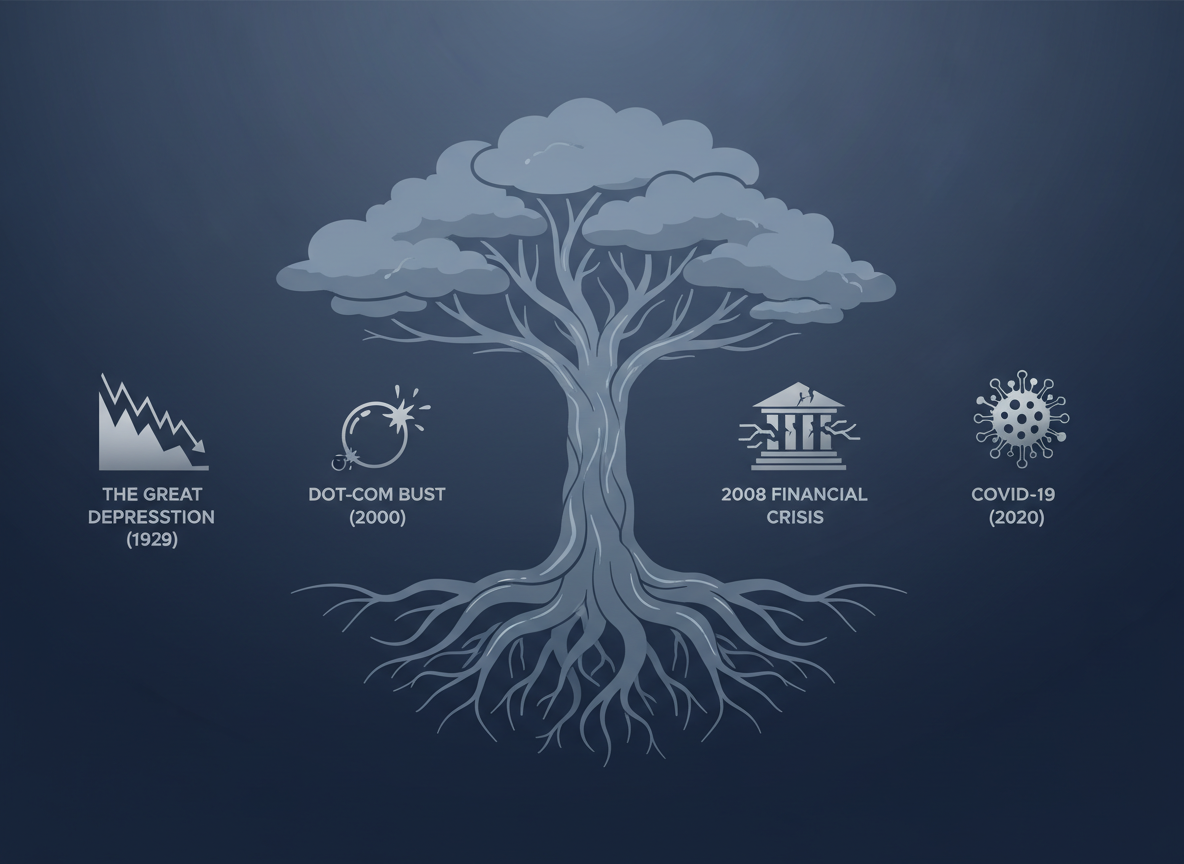
Why Most Second Opinions Miss the Mark (And How to Pressure-Test Your Wealth Plan)
Most “second opinions” miss the mark because they critique holdings instead of stress-testing the full plan—taxes, liquidity, concentration risk, and real-world scenarios. A high-quality second opinion isn’t a hot take. It’s a framework that reveals hidden risks, clarifies tradeoffs, and helps you decide whether to keep, adjust, or rebuild your wealth strategy with confidence.

Wealth Wisdom from History’s Greatest Downturns: What the Past Teaches Us About Resilience
Discover key lessons from history’s greatest financial downturns—The Great Depression, Dot-Com Bust, 2008 Financial Crisis, and COVID-19—and how they shape resilient wealth strategies for entrepreneurs, executives, and families. Learn actionable frameworks to safeguard and grow your wealth through uncertainty, with insights on adaptability, risk management, and long-term discipline.

The Founder’s Retirement Fallacy: Why Traditional Retirement Planning Fails Entrepreneurs
Most retirement planning advice was built for employees: steady W-2 income, predictable benefits, and a clean “retire at 65” finish line. Founders don’t live in that world.
Entrepreneur income is lumpy. Net worth is concentrated. And the “retirement plan” is often a business you can’t easily step away from—and may not be able to sell on your timeline or at the valuation you expect. That’s how so many founders end up rich on paper but financially exposed in real life.
In this post, we break down the Founder’s Retirement Fallacy: the assumptions that work for employees but quietly fail entrepreneurs. We cover the three risks traditional plans ignore (liquidity risk, timing risk, and identity risk), why “I’ll just sell the business” isn’t a plan, and what a founder-friendly framework actually looks like.
The goal isn’t a retirement date. It’s optionality: a business that can run without you, liquid diversified wealth outside the company, and a tax strategy that turns a future exit into after-tax freedom.

Poker Face Required: Bluffing Your Way Through Executive Compensation Negotiations
Executive compensation negotiations are a lot like poker: everyone’s playing with incomplete information, everyone’s smiling, and the real money is rarely in the obvious places.
Base salary and bonus are the ante. The pot is equity, deferred comp, severance, and change-in-control protection—and that’s where executives most often get outplayed. A package can look “huge” on paper while hiding landmines like subjective “for cause” language, vague clawbacks, board discretion on bonuses, or equity that only pays if you hit targets you don’t fully control.
In this guide, we break down a poker-inspired framework to help you negotiate smarter: when to fold a bad hand, when to raise with leverage, how to spot the tells buried in contract language, and which three “all-in” clauses you must understand before you sign (cause, good reason, and change-in-control terms).
You’ll also get copy/paste scripts you can use to ask for make-whole equity, double-trigger protection, tighter definitions, and clearer deferred comp terms—without sounding combative.

How to Give Smarter This Season: Charitable Strategies Beyond Writing a Check
Holiday giving is one of the best parts of the season—but writing a check isn’t always the most strategic way to do it. With a little planning, founders and executives can often increase impact, simplify recordkeeping, and potentially improve tax efficiency. Here are a few smarter charitable strategies—like donating appreciated assets, using a donor-advised fund, and “bunching” gifts—so your generosity supports the causes you care about and fits your bigger wealth plan.

Sports Betting vs. Investing: The Difference Most People Miss
Sports betting and investing both deal in uncertainty—but they don’t reward the same behavior. Betting pays for being right today. Investing pays for staying disciplined over time. Here’s the key difference most people miss, plus a simple framework to keep “fun money” separate from “plan money” so you don’t turn long-term goals into short-term wagers.

What Your Financial Advisor Isn't Telling You About Private Investments
"We have access to an exclusive private equity fund. Minimum investment is $100,000. It's only available to accredited investors."
Your advisor presents it as an opportunity. Sophisticated. Exclusive.
But here's the question most investors never ask: Why is your advisor recommending this specific fund?
Is it because it's genuinely the best fit for your portfolio? Or because your advisor gets paid more to sell it?
The uncomfortable truth: private investments are riddled with conflicts of interest, opaque fee structures, and recommendations driven more by compensation than client outcomes.
That "$50M private equity opportunity" might come with a 6% upfront commission to your advisor, a 2% annual management fee, a 20% performance fee, and administrative costs that eat nearly half your returns.
This guide exposes what your financial advisor isn't telling you about private investments: the hidden conflicts, the fee layers you're not seeing, the due diligence questions most investors never ask, and the transparent alternatives that remove the barriers of excessive fees, illiquidity, and opacity.
Because sophisticated investing shouldn't require you to pay for someone else's vacation.

Private Equity Wants Your Business: A Founder's Guide to Not Getting Screwed
he email arrives: "We've been following your company's growth and would love to explore a potential partnership."
It's from a private equity firm. A real one, with billions under management and a portfolio you recognize.
Your first thought: "We made it." Your second: "How do I make sure I don't get screwed?"
Private equity interest means you've built something valuable. It also means you're entering a negotiation where the other side has done this hundreds of times—and you've done it zero.
The gap in experience, sophistication, and leverage is massive. And that gap is where founders lose millions, get locked into bad deals, or wake up three years later realizing they sold their business but lost control of their life.
Most founders fixate on the headline valuation. But the deal structure—cash at close vs. earnout vs. rollover equity, employment terms, earnout clawbacks, control rights, debt structure—determines how much you actually get, when you get it, and what you have to do to earn it.
This guide breaks down what PE firms don't tell you in that first meeting, the terms that matter more than valuation, red flags to watch for, and how to negotiate better terms even if you've never done this before.

Your CPA Is Costing You Millions: The Difference Between Tax Preparation and Tax Strategy
You send your books to the CPA, they plug in the numbers, and a few weeks later you get a neat stack of returns and a simple message: “Here’s what you owe.” For most entrepreneurs, that’s the entire tax experience. The problem? If that’s the extent of your relationship with your CPA, there’s a good chance you’re leaving six or seven figures on the table over your lifetime.
Not because your CPA is bad at their job, but because they’re doing the job you hired them for: tax preparation—not tax strategy. Tax prep is backward-looking and compliance-focused. Tax strategy is forward-looking, proactive, and integrated with your business, investments, and estate plan.
This article breaks down the difference between the two, why most CPAs aren’t set up to do real planning, the hidden cost of “good enough” tax work, and what a true tax strategy team looks like for founders and high-net-worth families. If your tax season experience is just, “Here’s what you owe,” it’s time to ask whether your current setup is quietly costing you millions.

Founder PTSD: The Hidden Cost of Building Wealth Through Entrepreneurship
You made it. You built the business, survived the near-death moments, exited for eight figures. You have more money than you ever imagined.
So why can’t you sleep? Why does every market dip feel like an existential threat? Why do you check your portfolio compulsively, even though you have more than enough for three lifetimes?
This is the conversation almost no one is having: the psychological aftermath of building wealth through entrepreneurship.
Entrepreneurial wealth isn’t inherited or won in a lottery. It’s forged through years—sometimes decades—of stress, sacrifice, and survival. Payroll you weren’t sure you could make. Clients who could sink the company if they walked. Deals that almost didn’t close. That level of sustained pressure rewires your nervous system.
The result is what many founders quietly live with: “founder PTSD.” Hypervigilance around money, an inability to relax, difficulty spending even when it’s rational, or chasing risk because normal investing feels too boring.
This article unpacks what founder PTSD looks like, how it quietly sabotages financial decisions, and how to start healing your relationship with money after the exit.

Second-Generation Entrepreneurs: Building Your Own Empire in Your Parents' Shadow
Your parent built a business from nothing. Took the risks, made the sacrifices, achieved the success.
Now it's your turn—and the pressure is suffocating.
You're not starting from zero like they did. You have access to capital, connections, and knowledge that most entrepreneurs would kill for. But you also have something they didn't: the weight of comparison, the question of whether you can do it on your own, and the complicated psychology of building wealth when you already grew up with it.
This isn't about inheriting the family business. This is about the sons and daughters of successful founders who want to build their own empires—proving to themselves, their parents, and the world that they're not just trust fund kids coasting on family money.
Being a second-generation entrepreneur is both a privilege and a burden. The key is owning both sides of that equation—leveraging your advantages strategically while building something that's genuinely yours.
The goal isn't to escape your parent's shadow. It's to build something so bright that it casts its own light.

Geographic Arbitrage for the Wealthy: The Real Math Behind Multi-State Living
You've built wealth. Now the question is: where do you keep it?
For high-net-worth individuals and families, geography isn't just about lifestyle anymore—it's a financial strategy. The rise of remote work, digital connectivity, and increasingly aggressive state tax policies has made multi-state living not just possible, but potentially lucrative.
But here's what most people get wrong: moving between states isn't as simple as buying a second home and splitting your time. The math is more complex, the rules are stricter, and the mistakes are more costly than most realize.
A high-earner moving from California to Florida could save $266,000 annually in state income tax—$2.66 million over a decade. But after accounting for second home costs, travel expenses, dual-state professional fees, and lifestyle disruption, the net benefit might be $25,000-$35,000 annually instead.
This guide breaks down the real economics of geographic arbitrage—when it makes sense, when it's just expensive complexity, and how to do it right.

The Stealth Wealth Movement: Why More HNW Families Are Going Quiet
There's a quiet revolution happening among America's wealthiest families—and it's defined by what you don't see.
Gone are the days when success meant the biggest house, the flashiest car, or the most exotic vacation photos on social media. Today's high-net-worth families are increasingly choosing a different path: stealth wealth. They're driving reliable vehicles, living in understated homes, and keeping their financial success decidedly private.
This isn't about being cheap or ashamed of success. It's a strategic, intentional approach to wealth that prioritizes security, values, and legacy over status. And it's reshaping how sophisticated families think about everything from investments to estate planning.
Security concerns, next-generation values, lawsuit protection, and relationship authenticity are driving this cultural shift. The result? Families are rethinking their investment approach, estate structures, philanthropic strategies, and how they educate the next generation—all with discretion as a guiding principle.

The Wealth Transfer Tsunami: Preparing the Next Generation to Receive (Not Just Inherit)
Over the next two decades, $84 trillion will change hands in the largest wealth transfer in history. But here's the uncomfortable truth: 70% of these transfers fail by the second generation. The culprit isn't bad estate planning—it's that the next generation isn't ready to receive it. Inheritance is a legal transaction. Stewardship is a responsibility that must be cultivated over time.

What Your Coffee Order Says About Your Investment Style
You can tell a lot about someone by their coffee order. The same personality traits that drive you to order a triple-shot espresso or a meticulously crafted pour-over also influence how you approach investing. After 16 years of working with entrepreneurs and executives, I've noticed some fascinating patterns between caffeine preferences and financial decision-making.
Are you a black coffee purist who loves index funds? An espresso drinker with concentrated convictions? Or maybe you're the custom-order sophisticate with a highly optimized portfolio?
Grab your favorite brew and discover what your coffee order reveals about your investment personality – and how to leverage your natural strengths while avoiding common pitfalls. From the disciplined simplicity of black coffee investors to the trend-following Frappuccino enthusiasts, each style has unique advantages and blind spots.
The best part? Understanding your natural tendencies helps you build a portfolio that aligns with who you really are – not who you think you should be.

Q4 Tax Planning: Last-Minute Moves That Could Save You Thousands
October is here, which means you have exactly three months to make tax moves that could significantly impact your 2024 tax bill. While most people wait until April to think about taxes, smart wealth builders know that Q4 is when the real opportunities happen.

Why Fantasy Football Players Make Better Investors (And It's Not Just Luck)
Every Sunday, millions of Americans obsess over their fantasy lineups, analyze player stats, and make strategic decisions that could make or break their week. Sound familiar? It should – because fantasy football players are unknowingly practicing many of the same skills that separate successful investors from the rest.

Exit Planning Mistakes That Cost Entrepreneurs Millions
After 16 years of working with CEOs and entrepreneurs, I've witnessed both spectacular exits and devastating financial disasters. The difference often comes down to planning—or the lack thereof.
Most entrepreneurs pour everything into building their business but fail to plan their exit strategy until it's too late. This oversight can cost millions in unnecessary taxes, missed opportunities, and suboptimal deal structures.

When Commission-Based Investments Benefit Clients
Sophisticated investors understand that the best investment opportunities often come with different compensation structures. When commission-based investments provide access to institutional-grade opportunities like 1031 DSTs, Qualified Opportunity Zones, or private real estate that fee-only firms simply cannot offer, the focus shifts from fee structure to net outcomes and exclusive access.

The Future of Wealth Advice: Why AI + Human Matters—and What’s Coming Next
AI’s strengths are undeniable: it excels at parsing massive datasets in seconds, detecting trends, and generating portfolio insights on demand. For daily queries—like “How’s my portfolio doing this week?” or “What are the latest market shifts?”—AI delivers instant clarity.
But when it comes to crafting a wealth strategy tailored to your unique goals, values, and legacy concerns… that’s where human insight truly matters.
